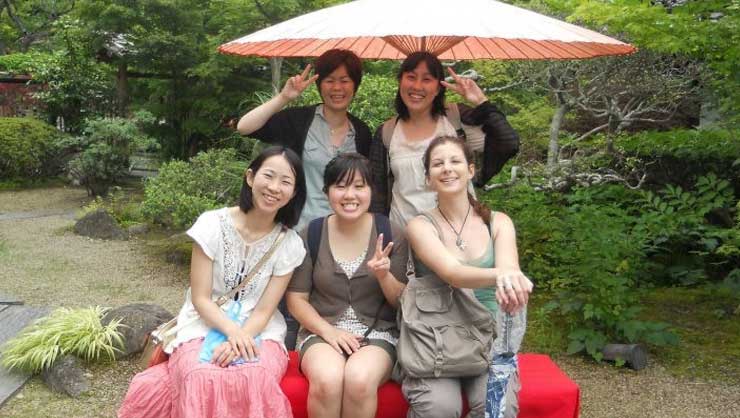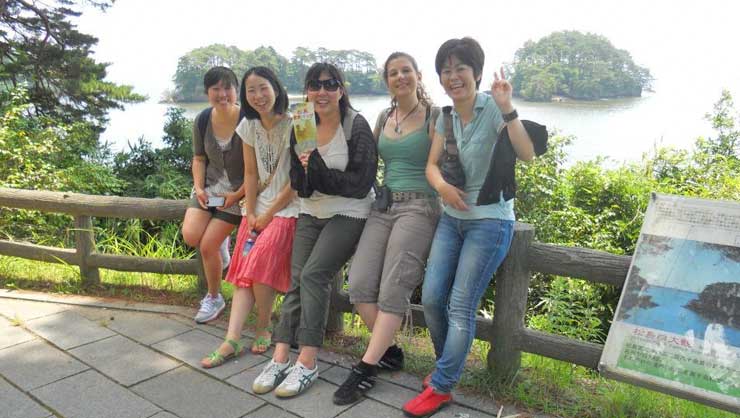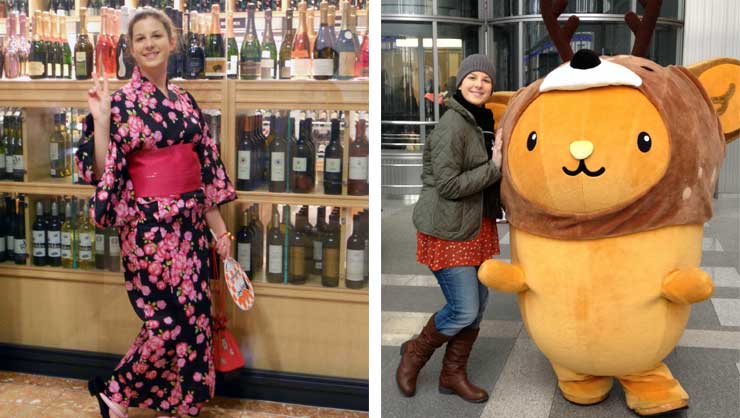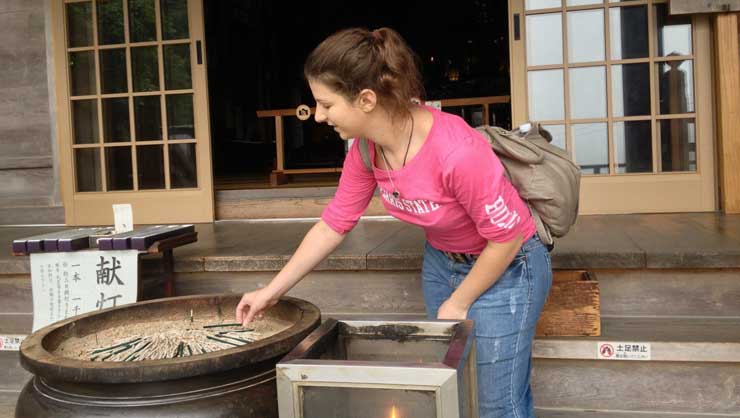
Image courtesy of Amber Guarente
Meet Amber, InterExchange AuPairUSA’s Orientation Manager! Prior to joining InterExchange, Amber lived in Japan for six years which gave her many amazing stories to tell. We asked Amber to share her experiences with us and also picked her brain about the advice she has for host families and au pairs based on her time living abroad.
Where are you from and what sparked your interest in cultural exchange?
I grew up in Florida and went to college in Orlando where I often ventured to Disney World with friends, sometimes even just for dinner. “Let’s have dinner in Norway,” was a common phrase in my life!
I first starting thinking about global explorations when I was an RA (Resident Assistant) in college. One year, I was the RA for the international floor where our international exchange students were housed. It was so much fun getting to know people from all over, eating all different kinds of food, and learning a few language phrases here and there.
Why did you choose to move to Japan?
I have a degree in Film Production, and I interned at FUNimation for a summer, the largest US dubbing and DVD distribution company for anime. I was obsessed with anime, and I was looking to make it my final career goal to work in the industry. I thought it might not be a bad idea to go over to Japan for one year to see where anime comes from and see first hand the culture it portrays.

Image courtesy of Amber Guarente
While I was in Japan, I worked for an international school in Tokyo… and one year became six. I fell in love with the country, and I say country because I didn’t start in Tokyo. I was in a school for a year in Sendai, then a year in Kanazawa, before I switched to the International School in Tokyo for the final four years.
My time at the International School reignited my love of being surrounded by an international community, and it also made me realize that I have a love of teaching. While I was at the school, I was the English Language Support Instructor for K1 (3 and 4 year-olds), as well as the LEAP Coordinator (the before/after school study and tutor program).
It was very hard to leave, as I had made a life there, some lifelong friends, and felt like I was leaving an entire life behind me. I still go through times when I miss Japan so much, but I’m very happy to be back in my home country as well.
What were the best and most challenging parts of living in Japan?
The best part is a toss-up between the food and the traveling I did. I visited over 15 cities, including spending New Year’s in Kyoto which was beyond incredible, and a week in Nikko which was truly sublime, so gorgeous. I love traveling, and there was so much to see in Japan for many reasons, from historical to fun to bizarre.

Image courtesy of Amber Guarente
The most challenging thing I’d have to say is again a toss-up between the language barrier and homesickness.
Japanese has three writing styles and several levels of speech, so it was very difficult for the first year or so. But once I learned a few key phrases, it became much easier.
I really struggled with homesickness for a good six months. It was very difficult, most especially around the holidays, which is why I went traveling as much as I could to get my mind off of it.
What are the main lessons or memories that you walked away with?
The main lessons I learned were definitely to be very open-minded and patient. Dealing with people from all over, it’s very easy to forget that someone is not actually being rude, it’s just that in their culture, they are used to speaking bluntly. Or even the opposite, having to tease apart someone’s words to get to their point because their culture believes in not speaking in a direct manner.
I think some of my most cherished experiences were the New Year’s celebrations at my international school when they would bring professional sumo wrestlers to the school to help the children pound mochi and wrestle with the children and teachers alike. As well as their Fall Festival which was so much like American Halloween, it was amazing. Oh, and their DEAR festival (Drop Everything And Read) in which everyone dresses up as their favorite book character for a day. And Culture Day, when everyone dresses up in their culture’s traditional garb and we all discuss where we all come from. So amazing!

Image courtesy of Amber Guarente
What excites you about leading au pair orientation?
So much. I love being able to see and speak with people from all over. It’s always a different experience, which I really enjoy.
I also love how at the beginning, everyone is wide-eyed and unsure and eager but also a little terrified. Then after I speak with the au pairs for a few days and explain everything, try to make them laugh a bit, and help them better understand the culture they have just suddenly found themselves in, they always leave with a look of assuredness and excitement. I absolutely love that.
What advice would you give to host families to help their au pair transition into life in the USA?
Be patient and open-minded with your au pair. That’s the most important thing. Living overseas away from your own family and friends for any amount of time is very difficult. And be aware that they are interested in sharing their culture with you if you let them.
These au pairs only know of American culture what they have seen on TV and in movies, which I can guarantee you is not all we are. I remember being in Japan and seeing news reports and documentaries about only our most bizarre and worst parts. It really made me sad to think that this is all the world gets to see. So I did what I could to share my culture with those who were open and curious.
In the same way, show your au pair what it really means to be an American in America. If there is an event, festival, or historical site that your area is known for, definitely bring them along and show them our real culture.
Don’t forget the fact that these young people are coming from a culture that you have very limited knowledge about. Ask lots of questions, like what their traditional meals are or how to celebrate certain holidays they have from their home country. Let them share their culture with you.
What advice would you give to au pairs?
Above all, be patient with yourself. It’s a very scary thing to uproot yourself and be thrown into the deep-end of another culture. Don’t let it intimidate you!
One of my favorite quotes is by author Mandy Hale, “It’s okay to be scared. Being scared means you’re about to do something very, very brave.” I can’t express how true to life this is.
But don’t just stop at, ‘Okay, I’m brave just by being here.’ Yes, you are, but why not take it a step further? A rule I had for myself for my first year in Japan was every new experience presented to me, I said ‘YES.’ Mind you, there was that little voice in the back of my head that said ‘But new things are scary…’ I just told that voice ‘All the more reason to do it.’
And I have so many incredible memories to prove it.
In closing, if I can live abroad, anyone can do it! We at InterExchange are here with you, both host families and au pairs, to support you every step of the way. We want you all to have an amazing experience to walk away with, just as all of us at InterExchange have had done for us.
